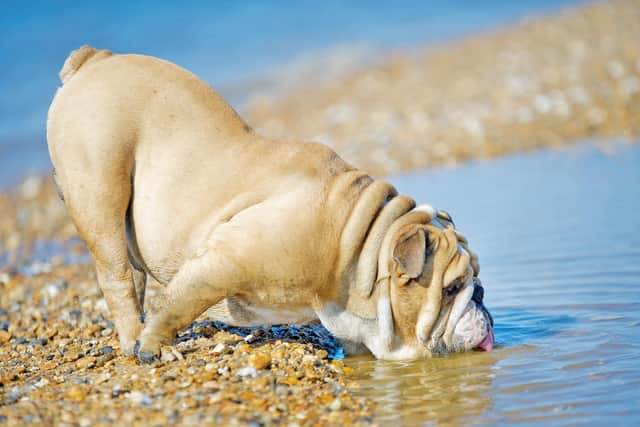The symptoms of seawater poisoning in dogs and how to prevent it
It’s a common issue for dog owners who enjoy taking their pooch to the beach for a walk and a swim – when their pet gets hot it cools off by drinking some of the cold water all around.
In most cases the dog will be fine, as a small amount of salt water will do nothing much more than make your mutt more thirsty.
Advertisement
Hide AdAdvertisement
Hide AdBut can it cause more serios problems? Here’s all you need to know before you take your dog for a trot on the sand, according to Sean McCormack, Head Vet at specialist dog food website www.tails.com.
Is it dangerous for a dog to drink salt water?
Seawater contains a high balance of salt, approximately 35 grams of salt in every 1 litre (1000 ml). If your dog drinks too much it can quickly become dehydrated, and symptoms can worsen if your dog isn’t provided with fresh drinking water.
Even if you keep a watchful eye over your furry companion during your visit to the beach, it can be challenging to tell if they have been drinking seawater whilst splashing about, taking a dip and playing fetch in the water.
The high levels of sodium chloride in the seawater can disrupt the fluid balance in your dog’s body, drawing water from the blood into your dog’s intestines. If your dog has ingested too much seawater, it can lead to serious health problems.


What are the symptoms of seawater poisoning?
THe symptoms of seawater poisoning are diarrhoea, vomiting, a lack of appetite, lethargy, convulsions, increased heart rate, instability, loss of coordination, loss of appetite, excessive thirst or urination, tremors and seizures.
If you recognise these signs within your pup during your trip to the beach, you need to get them to the vet as soon as possible. If left untreated they could suffer serious kidney damage, brain damage and rapid dehydration which could prove fatal.
How can you prevent seawater poisoning?
Dogs love the beach, but playing fetch, jumping the waves, and swimming can all lead to a very thirsty dog. When our furry friends are thirsty, they will almost drink anything - and this includes seawater. It’s essential when heading to the beach to bring a dog bowl and fresh water for your pup to drink – you can buy a portable water dispenser from your local pet shop.
It’s also a good idea for your dog to take a break from the sea every 15 minutes or so. Use this time to offer your dog fresh water, if they are refusing to drink, squirt or pour it directly into their mouth. Regularly drinking fresh water will help to rehydrate them.
Advertisement
Hide AdAdvertisement
Hide AdKeep a close eye on your dog when they head down to the waters and limit your beach outings with your furry friend to two hours.”
What to do if your dog drinks too much seawater?
Saltwater consumed in small quantities is usually not harmful and may only cause diarrhoea, but drinking larger amounts can disrupt the fluid balance in your dog’s body, and high levels of salt can be fatal for your dog.
If your dog has consumed a lot of seawater, take them home and monitor them. If they are showing the symptoms of seawater poisoning, take them directly to an emergency vet to be observed. The vets will help to reduce the sodium levels in your dog’s blood.
Providing a relaxing and calming environment for your pup is crucial for recovery. Bring their belongings into a quiet room, one that can be easily cleaned as your dog may suffer from vomiting and diarrhoea. Give your dog small amounts of water every 30 minutes, to help their bodies replace the fluids.
For more information about www.tails.com and their specially-tailored meals for dogs click here.
A message from the Editor:
Thank you for reading this article. We're more reliant on your support than ever as the shift in consumer habits brought about by Coronavirus impacts our advertisers.
If you haven't already, please consider supporting our trusted, fact-checked journalism by taking out a digital subscription.
Comments
Want to join the conversation? Please or to comment on this article.